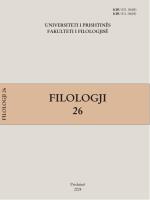A Gender-Based Lexical-Semantic Analysis of Children: A Developmental Perspective on Word Association Responses
A Gender-Based Lexical-Semantic Analysis of Children: A Developmental Perspective on Word Association Responses
Author(s): Ruhan GüçlüSubject(s): Language studies, Applied Linguistics, Lexis, Semantics, Philology
Published by: Univeristeti i Prishtinës, Fakulteti i Filologjisë
Keywords: syntagmatic-paradigmatic shift; concrete-abstract shift; clang responses; word association; lexical-semantic development; gender-based perspective;
Summary/Abstract: Syntagmatic-paradigmatic shift (S-P shift), concrete-abstract developmental shift and less clang and more semantically related word retrieval behavior are instances of cognitive phenomenon which occur somewhere between the ages of five and ten as a child’s language matures and indicative of a more developed semantic system as paradigmatic over syntagmatic responses, abstract over concrete responses and fewer clang associations go hand in hand with maturity in semantic knowledge. Being one of the major techniques used in linguistics, neuropsychology and psycholinguistics, a free word association test (WAT) was applied in the present study as it was accepted as one of the simplest experiment techniques to reveal the association mechanisms (Sinopalnikova,2003). The present study examines the word association behavior of children in regard to the use of syntagmatic, paradigmatic, clang, concrete, and abstract responses through a qualitative and quantitative analysis from a gender-based perspective. To this end, a word list composed of 12 stimuli words was presented to a total number of 234 11-year-old Turkish-speaking children and they were asked to write the first words coming into their mind. The analysis of the responses to WAT revealed that both groups have an inclination towards generating more paradigmatic and less clang responses, which indicates a developed semantic network, especially considering that the resulting word associations are thought to mirror the way the words are stored and linked in the mental lexicon. Although clear developmental shifts have been observed, it is found that girls produced overwhelmingly more abstract responses than boys, which could point out some gender based differences and that the girls are more inclined to perform abstract reasoning, which could reason from the high use of emotional associations. The results of the study have important implications for language teaching, sociolinguistics, and developmental psychology.
Journal: FILOLOGJI
- Issue Year: 2024
- Issue No: 26
- Page Range: 79-103
- Page Count: 25
- Language: English

